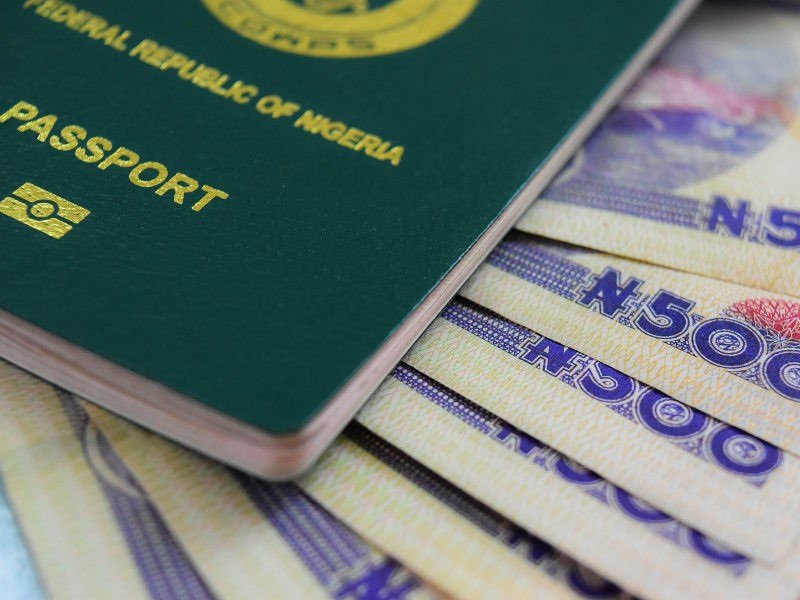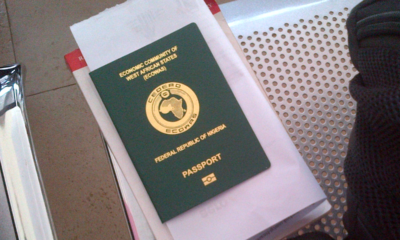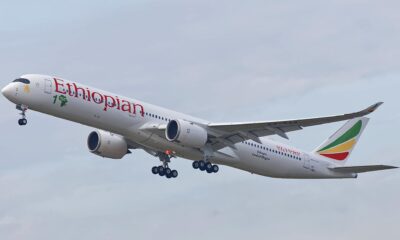Travel
Passport Power Ranking Records Widest Ever Gap in Travel Freedom
Published
3 years agoon

The latest results and research from the Henley Passport Index show how proliferating barriers to entry over the past 18 months of the pandemic have resulted in the widest global mobility gap in its 16-year history, with passport holders from top ranking Japan and Singapore able to travel visa free to 166 more destinations than Afghan nationals, who sit at the bottom of the index with access to just 26 countries without requiring a visa in advance.
Based on exclusive data from the International Air Transport Association (IATA), the index, which ranks all of the world’s passports according to the number of destinations their holders can access without a prior visa, shows that countries in the global north with high-ranking passports have enforced some of the most stringent inbound Covid-19-related travel restrictions, while many countries with lower-ranking passports have relaxed their borders without seeing this openness reciprocated. This has created an ever-widening gap in travel freedom even for fully vaccinated travelers from countries at the lower end of the passport power ranking who remain locked out of most of the world.
Unique research and expert analysis commissioned by leading international residence and citizenship by investment advisory firm Henley & Partners indicates that this gap is likely to increase, as pandemic-related restrictions become entrenched and amplify the already significant global mobility divide between advanced and developing economies. Japan, which shares top spot on the index with Singapore due to their visa-free/visa-on-arrival score of 192, currently bars almost all foreign nationals from entry. Germany, which sits alongside South Korea in joint-2nd place with a visa-free/visa-on arrival score of 190, currently restricts nearly 100 countries from entry.
At the lower end of the index, Egypt, ranked 97th, currently has no travel restrictions in place, yet its citizens can access just 51 destinations around the world without acquiring a visa in advance. Similarly, Kenya, which ranks 77th, has no travel bans in place, yet its passport holders are able to access just 72 destinations visa-free.
Has Covid become an excuse for curbing visitors from the global south?
In response to recent developments, experts suggest that restrictive policies initially introduced to contain the spread of Covid-19 are now being conveniently applied to contain mobility from the global south. Commenting in Henley & Partners’ Global Mobility Report 2021 Q4, Prof. Mehari Taddele Maru, a Fellow at the United Nations University Institute on Comparative Regional Integration Studies, points out that the rationale behind the restrictions on travelers from the global south are not necessarily related to vaccination or infection rates, as they are subject to quarantine requirements whether they are vaccinated or not. “The global north has been enforcing aggressive migration containment strategies for some time now through the rigid application of border controls, undermining the movement of persons in various ways. Covid-19-associated travel restrictions are new additions to the toolbox of migration containment instruments employed by the global north to curb mobility from the global south.”
Recent adjustments to the Covid-ban policies of the UK and the US, which share 7th place on the index with a visa-free score of 185, have done little to alter what experts perceive to be growing inequalities when it comes to travel freedom and access. Nor has their refusal to recognize vaccines administered across Africa, South America, and South Asia.
Commenting on these latest developments, Dr. Christian H. Kaelin, Chairman of Henley & Partners and the inventor of the passport index concept, notes that these decisions are likely to have far-reaching consequences. “If we want to restart the global economy, it is critical that developed nations encourage inward migration flows, as opposed to persisting with outmoded restrictions. Resourceful countries need to futureproof their economies by attracting and welcoming the upcoming generation. It is pivotal that advanced nations consider revising their current somewhat exclusive approach to the rest of the world and reform and adapt to overcome the competition and not miss the opportunity to embrace the potential.”
EU, UK, and US policies present complex obstacles on road to normality
As advanced economies contemplate a return to business as usual, experts note that many challenges lie ahead. Commenting in the Global Mobility Report 2021 Q4 on the UK’s recent travel ban adjustments, Dr. Hannah White OBE, Deputy Director of the Institute for Government, a leading London think tank, says that restrictions to international movement look certain to continue to affect travelers to and from the UK well into 2022. “The direction of travel has been towards greater freedoms, but ongoing requirements for expensive tests and quarantine for those vaccinated outside the UK, and the absence of an approved international vaccination certification scheme, continue to rule out visits for many international travelers, limit short-term international travel for UK residents, and potentially cause issues for UK residents vaccinated in non-approved countries.”
Convoluted and ever-changing travel restrictions are also causing setbacks across the Atlantic, says Greg Lindsay, Director of Applied Research at NewCities, who notes that while the US recently lifted restrictions for travelers from the EU, the bloc has voted to remove America from its ‘safe list’ of countries. “As has been the case throughout the pandemic, passports once thought to be sacrosanct are again in flux due to parabolic case counts and shifting politics. The predicted Q4 return to normalcy now offers more questions than answers. The run-up to year end promises to be a race between vaccinations and variants, with the pandemic’s eventual end hanging in the balance.”
Dr. Leila Hadj Abdou, a lecturer in the Department of Political Science at the University of Vienna and a part-time assistant professor at the Migration Policy Centre at the European University Institute in Italy, says that the EU is facing complex challenges of its own. “International migration and mobility will continue to play an important role in the EU’s economy and its development, given the ongoing skills shortages across many member states. New Covid variants that are spreading faster — and among younger, non-vaccinated cohorts in particular — are causing uncertainty regarding whether the economy can remain open, especially in (migrant-reliant) sectors such as tourism and hospitality.”
Unpredictability hits developing world hardest
For many countries with low-ranking passports on the Henley Passport Index, proliferating barriers to entry are hindering progress, even as many reopen their borders in desperate bids to reboot economic growth. Erol Yayboke, senior fellow with the International Security Program and director of the Project on Fragility and Mobility at the Center for Strategic and International Studies (CSIS) in Washington, DC, points out in the Global Mobility Report 2021 Q4 that the pandemic’s sustained impact on global human mobility means that there may never be a post-pandemic world to navigate. “Covid-19 is as much an economic crisis as it is a public health one, though in both regards it disproportionately negatively affects migration origin countries. Increased pressure to move for survival will be met with pandemic-related barriers to movement that are likely to linger, both because the virus itself is lingering and because increased control over migration will be difficult for some leaders to relinquish.”
Commenting on the mounting barriers to entry faced by African countries, the award-winning South African journalist Justice Malala notes that the rest of the world remains largely inaccessible to travelers from the continent, with new obstacles emerging. “In an attempt to restart the economy, the South African government announced in early September that it had commenced with developing a digital Covid-19 vaccination certificate to confirm proof of vaccination that would align with international standards, which would be available before the end of the month. Officials had previously said the country would introduce a vaccine passport together with other African nations — but achieving uniformity and legitimacy of the document across the continent is proving a challenge.”
Renewed focus on safety, stability, and healthcare
In taking stock of the dramatic changes wrought by the pandemic, experts in the Global Mobility Report 2021 Q4 suggest that a global vaccine hierarchy is emerging. Kevin Bürchler of the SIP Medical Family Office in Switzerland says having access to vaccinations with the widest approval and acceptance rates may result in higher health security, but also in more convenience during travels. “AstraZeneca’s non-replicating viral vector vaccination currently ranks number one, having been approved by more than 120 countries. Pfizer–BioNTech’s vaccination is currently approved in 98 countries, Russia’s Sputnik in 71 countries, and Moderna in 69 countries worldwide. Your health or vaccination status — sometimes in combination with additional passports — may now be even more important for your global access rights than your primary passport is.”
Dr. Juerg Steffen, CEO of Henley & Partners, says that at a moment of great uncertainty, investment migration programs offer an invaluable source of stability. “For the countries that are able to offer these programs, the security they provide acts as a safeguard against the economic volatility that continues to wreak havoc across the world. For more and more people, it is self-evident that acquiring a second citizenship or alternative residence, or both, is a foundational building block for a safe and stable future.”
Is the CEO and Founder of Investors King Limited. He is a seasoned foreign exchange research analyst and a published author on Yahoo Finance, Business Insider, Nasdaq, Entrepreneur.com, Investorplace, and other prominent platforms. With over two decades of experience in global financial markets, Olukoya is well-recognized in the industry.

You may like
-


Canada Closes Pathway to Permanent Residency for Foreign Students in Major Immigration Policy Shift
-


Ethiopian Airlines Achieves the Four-Star Global Airline Award
-


Canadian Government Gives Immigration Officers More Power, Ends Decade Old 10-year Visa Option
-


Ethiopian Airlines Welcomes Africa’s First A350-1000 Aircraft
-


Nigeria Immigration Service Launches New Passport Renewal Mobile App, Issues Registration Guidelines
-


CNG Vehicle Explosion in Edo State Leaves Multiple Injured, Properties Damaged








